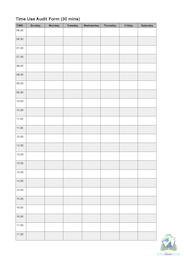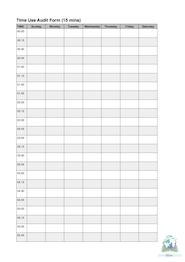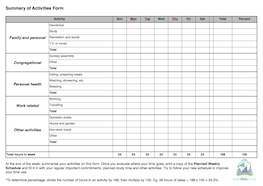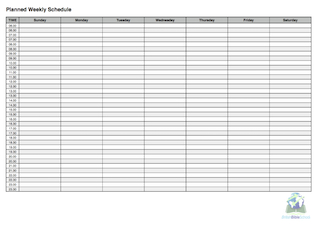 It is probably a good idea to watch the very short “When to Study” video presentation before undertaking the section. You will find this by clicking here, or by finding the appropriate page in the menu.
It is probably a good idea to watch the very short “When to Study” video presentation before undertaking the section. You will find this by clicking here, or by finding the appropriate page in the menu.
Make the time
Just as important as finding the right place to study is making the right time for it too. In spite of being surrounded with so many labour-saving devices, most of us have lives that are already too busy for our own good and the idea of introducing new activities on a regular basis can seem somewhat daunting at first. But where there’s a will …
Remember this, you are unlikely to find time to study – you must make it. That is, unless we plan to incorporate activities into our busy schedules we are likely to find ourselves asking, “Where has the time gone?” only to discover that the day is over and we haven’t accomplished all that we had hoped.
The passage from Ephesians to which we referred in the video urges us to make the most of our time, “because the days are evil” (Ephesians 5:16). Satan has done a thorough job of filling so many lives with trivialities, let alone so much more, that it is up to us to reclaim our time and use it wisely in the service of Christ. The word Paul uses here and in Colossians 4:5 is ‘εξαγοραζω / exagorazo and speaks of “buying out” for one’s own use.
 Time audit exercise
Time audit exercise
One way to help better manage our use of time is to undertake a time audit. The purpose of this is to help us take an objective look at the way in which we use our time, with the aim of making better use of this precious, irreplaceable, God-given resource.
There are some forms below for you to download in order to carry out this exercise. Here is how it works:
Time Use Audit Forms
- Record everything you do during a typical week (assuming that there is such a thing) on one of the Time Use Audit Forms provided.
- For this exercise, a “typical week” is one in which you had control over what you did and when you did it (as opposed to a week where demands were placed on you over which you could exercise little if any control).
- You can record events for each half-hour period during the week that you choose or, for greater accuracy, you can record every 15 minute period. Time Use Audit Forms are provided here for both options.
 Here is a sample of the sort of thing you might want to do:
Here is a sample of the sort of thing you might want to do:- Whichever forms you use, try to be honest and record what you actually did – not what you think you ought to have done!
Summary of Activities Form
- At the end of a week, complete the Summary of Activities Form to see how you spend your time.
- You should calculate this as a percentage of the whole.
- After you have evaluated how you use your time, look for areas in which you might ‘buy back’ some time for more worthwhile pursuits such as study time.
Planned Weekly Schedule
- Once you evaluate where your time goes, use the Planned Weekly Schedule to fill in your regular important commitments, planned study time and other activities.
- This schedule runs from 06.00 to midnight but if you work shifts or have other irregular time commitments you might need to revise this somewhat.
- Once filled in, try to follow your new schedule in a disciplined fashion to improve your time use.
Of course, simply having a timetable is not going to make any difference unless we are prepared to discipline ourselves and stick to it – as far as we are able. And we should add: “If the Lord wishes, we will live and do this or that” (James 4:15, NRSV).
You might also find the following site useful:
http://studygs.net/schedule/weekly.htm 1
Some more considerations:
“Be a lert”!
When scheduling your study time, you should try to discover when you are most mentally alert. We are all different – some of us are more alert in the mornings and some in the evenings – but you know yourself best.
It could be that a new opportunity opens new possibilities. There are some who having not previously been ‘morning people’ have discovered that having the incentive to study enables them to wake early one or two mornings a week – you will simply need to find what is best for you. And when you do – try to reserve that time as your study time and let others know that you’re just not available then!
Take a break
Aim to take a break after two hours – or sooner. Your brain needs short, quiet times to keep operating effectively, especially if you are working on something challenging. You might want to make a note of the very next thing you need to do when returning from your break to help you resume your train of thought.
Don’t allow yourself to get side-tracked by beginning another pursuit. Instead, drink tea or enjoy a bowl of cereal, take a stroll around the estate, finish the crossword – but nothing too serious – remember that this is still your study time!
Try to exercise sensibly. Walking is good for both the body and the mind and many essays of world renown must surely have been conceived walking through field and country.
Time audit forms to download
Please click on the following images to download selected files for your Time Audit Exercise:
< A Place to Study Reading Skills >


